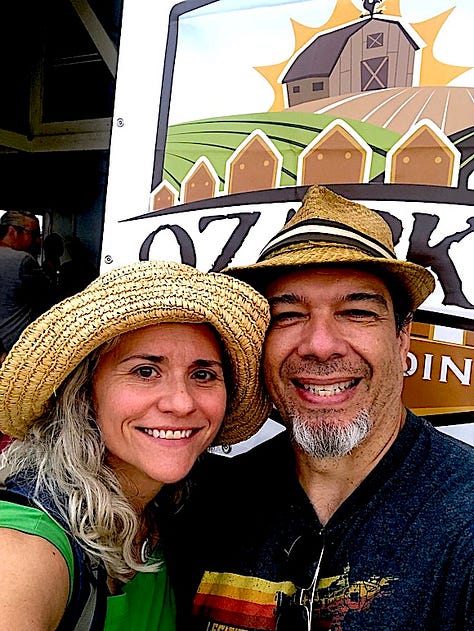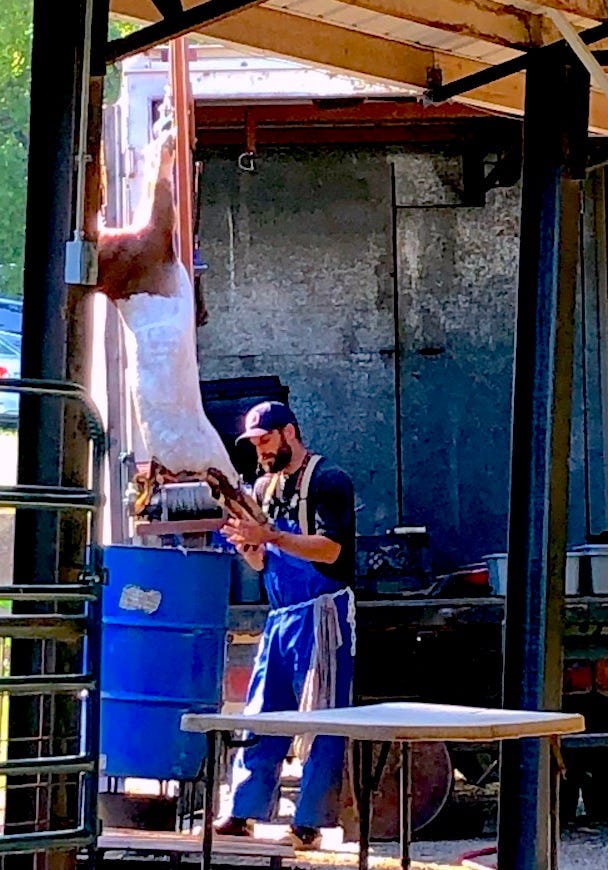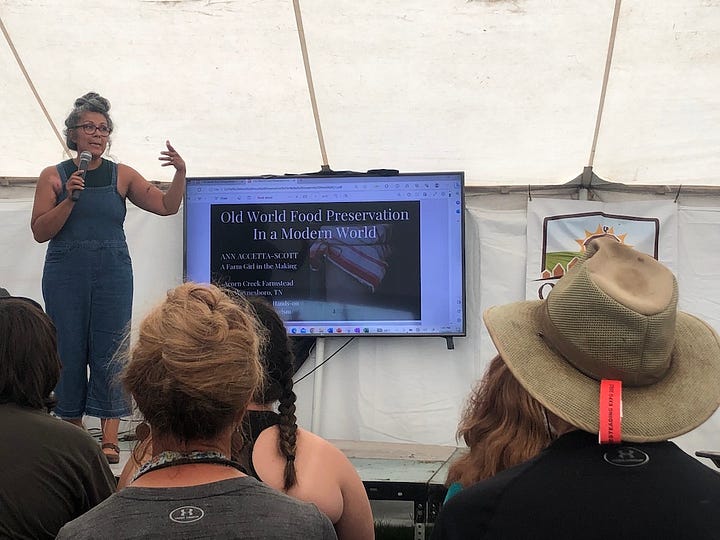Ozarks Homesteading Expo
We came, we saw, we picked an axe!





By Lisa Brunette
Anthony and I hadn’t had a day off since December, so when he convinced his new employer to let him take a Thursday-Friday vacation, we decided to use it to learn more about homesteading.
What better place to do that than in the Missouri Ozarks?
I found out about the Ozarks Homesteading Expo when celebrity farmer and professional curmudgeon Joel Salatin announced on his blog that he’d be speaking there. It’s only three hours away, so a quick trip by car seemed just the ticket for a short bit of time off. I’ve been an admirer of Salatin since learning about his story in Michael Pollan’s The Omnivore’s Dilemma and then reading Salatin’s own book, Everything I Want to Do Is Illegal1. Cementing the decision was the fact that Brandon Sheard, the Farmstead Meatsmith, was also on the schedule.
These guys can be counted on to deliver excellent demos, which they did. And everyone else in the two-day lineup held their own as well. It was a great event, and we’re already planning for next year.
Here are the highlights (there weren’t any lowlights!).
Meat of the Matter
First, let me get the butchering stuff out of the way, especially for those of you who might be meatsqueamish. That’s not a Pacific Northwest town name taken from Native American languages; it’s what I used to be before I looked at the whole meat-eating thing head-on and embraced it after a long bout of vegetarianism.
The aforementioned master butchers—Salatin and Sheard—gave live demos. Salatin humanely dispatched five hens and then walked us through the entire process of scalding, plucking, and gutting them.
Salatin’s an entertaining guy, and his presentation was loaded with gems. “Fifty percent of customers don’t know chickens have bones,” he lamented, in between complaints about Americans’ singular obsession with boneless, skinless, white breast meat. In case you don’t know what I’m talking about, just ask our best chefs. They’ll tell you dark meat is moister and more flavorful, and chicken fat is essential for taste.
If we want to raise a generation of optimal young people who don’t think about fentanyl and suicide because they have a sense of self-worth, it comes from successfully completing meaningful tasks. — Joel Salatin
“We’ve been doing this a long time,” Salatin said of his operation, Polyface Farms, “and we’ve watched the culinary deterioration of America.”
This being a homesteading conference, and homesteaders largely a familial lot, there were plenty of children of all ages in attendance. Yes, even for the butchering. A mother asked how to involve her seven-year-old in that time-honored work, and Salatin gave several suggestions from his family’s own experience.
He followed up with this: “If we want to raise a generation of optimal young people who don’t think about fentanyl and suicide because they have a sense of self-worth, it comes from successfully completing meaningful tasks.”
Brandon Sheard’s demo was our first one of the Expo, and what a place to begin. If you’ve never heard him speak, I highly recommend it. I first listened to him via homesteader Justin Rhodes’ podcast; Sheard is the one who convinced me it’s OK to name your farm animals. He talks in gentle, philosophical tones, weaving stories about old-world practices with valid critiques about our modern way of life.
He showed a rapt audience how to scald and butcher a pig, and I have to say I found the entire experience so moving, it made me tear up. He handled the animal with reverent respect, scalding instead of skinning it to leave the crucial skin intact and preparing the pig so that not an inch is wasted. His son was on hand throughout the process, assisting when needed.
Anthony and I are not raising animals for meat per se, but when we start over with a new flock of layers, we want to do right by them. That means harvesting the hens before they grow old and infirm, as nature doesn’t keep animals to old age as pets.
Can I butcher a hen, as a former vegetarian and meatsqueamish person? I don’t know. I took the loss of my five chooks pretty hard this year, but I like to think I can learn to separate my own ego-driven emotional stuff from the stuff of life, the cycle that is.
It’s important for us to see and understand how food ends up on our table. Anthony and I buy meat from local farmers, though they use licensed abattoirs in order to sell it to us instead of butcher it themselves on the farm. I believe people in general and especially Americans in particular are far too divorced from the realities of where meat comes from, so it’s good to stare it square in the face, to acknowledge and accept it, especially when it’s done with humanity and dignity. Watching a hands-on demo from intimate operators like Salatin and Sheard helps you see that it can be a lot better than the way we do things here in the modern US of A, with our confined animal feedlot operations turning the enterprise into a despicable, inhumane affair.
“We don’t need a single chicken factory anywhere in the world,” said Salatin.
Preservation Wake-up Call
Another big Expo takeaway is realizing the value of old-world food preservation techniques. Most folks think of canning when it comes to putting away food stores, and then freezing, and now the trendy thing is freeze-drying. But according to Ann Accetta-Scott of Acorn Creek Farmstead, who presented on canning as well, fermentation should be at the top of the list, with drying as a close second.


Fermentation is so key to homesteading that two different presenters tackled it over the two days. Joyce Morris of Patch of Heaven Homestead began her talk by holding up two jars of green beans. One was a vibrant kelly green, appearing fresh off the vine. The other was the color of my Dad’s old military fatigues.
Can you guess which one was canned, and which one fermented?
Fermentation seals in the vitamins, minerals, and other nutrients in fresh vegetables. Canning drains some of that out through the heat processing.
There’s also the taste factor. If “fermentation” only takes you to sauerkraut, you’re not trying hard enough. We’ve covered carrots previously, and they’re my favorite ferment so far.
Seriously, nothing beats a pickled carrot done in a fermented salt brine. Skip the vinegar!
Gather Ye Ladies
The Expo was a great resource for a number of new finds: electric poultry fencing, fermentation lids, an alternative source of canning lids, and a natural remedy for brown-recluse bites. But the best might be discovering the National Ladies Homestead Gathering, a non-profit bent on reaching women who might feel “disconnected from the social norm.” Um, yeah, that’s me.
Their stated goals align with our own here at Brunette Gardens:
National Ladies Homestead Gathering (NLHG) is not about acres of land but rather about doing homesteading activities wherever you live. We have urban, suburban, and rural Chapters nationwide. We help women connect in their own areas to share knowledge, build communities, and grow friendships.
Unfortunately, at this gathering, when the time came to break into groups based on locale, I found myself alone again, as there was no one else from my county or anywhere near it in attendance. But I’d run into another St. Louisan at the Expo the previous day, someone I’d met through our Sustainable Backyard Network, so I know the river city did represent!
There’s no NLHG chapter here in the Lou, alas, so we’ll have to start our own. If you’re in the area and interested, let me know in the comments.
Sourdough and More
While I’ve been baking with sourdough for three steady years now, I did receive a few worthwhile tweaks from Lisa Bass of Farmhouse on Boone. I’ve been keeping my sourdough on the counter this summer instead of refrigerating it, and thanks to Bass, I now know I haven’t been feeding it sufficiently, nor as boldly as I need to be. She says you can take it all the way down to a few tablespoons and keep getting results, and that you need to feed it with an amount of flour and water equal to the starter itself. I believe mine has been going too long and sliding too far into the bacterial realm instead of yeasty. It’s a process…
Because cheese continues to hold power over me despite my dwindling options as the food cartel pushes for more processing and lab ingredients, I attended a cheese workshop. While ricotta was already firmly in my wheelhouse, I’m keen to try chevre and aged cheeses.
If you made it this far and are still waiting to find out about the axe I mentioned in this article’s subhead, thank you. We didn’t actually buy any axes, but we could have, as vendors were selling them, along with knives, water filters, tiny homes, herbs, goat-milk ice cream I could actually eat because it didn’t contain any MfGs, and more.
Why would a couple of middle-aged suburbanites like ourselves attend a homesteading expo? After all, we have no livestock right now, not even that small flock of chickens from the spring, as they were taken by predators at just eight weeks. We possess neither barn nor greenhouse. We’re on city utilities, and our land holdings clock in at just a quarter-acre.
The answer: We learned a lot about modifications we can make to our farmhouse and garden if we stay here for the long haul, as well as what to look for if we move on to somewhere else. We also gained a better understanding of the relationship between farmers and domesticated animals, and we got religion on fermentation and drying.
More than that, we met some terrific homesteaders, enjoyed fellowship and communion with likeminded souls, and discovered we can sit through a day of outdoor-tent presentations in near-100-degree temps without once getting snippy!
I hope this recap has been helpful for you, my fellow gardener and wannabe homesteader. You can stop calling yourself “wannabe” now. You already be.
Affiliate link. If you purchase Salatin’s book via the link, we might receive a small commission at no extra cost to you.





What are your experiences with homesteading? What are you doing on your kitchen countertop, apartment balcony, city backyard, and beyond to boost your healthy food options?
I loved Salatin's book, and the Ozarks is one of my favorite places in the world. Some of the most interesting people I have ever met live there. I wish we had such an expo here in central Minnesota. Perhaps I should look into starting one.